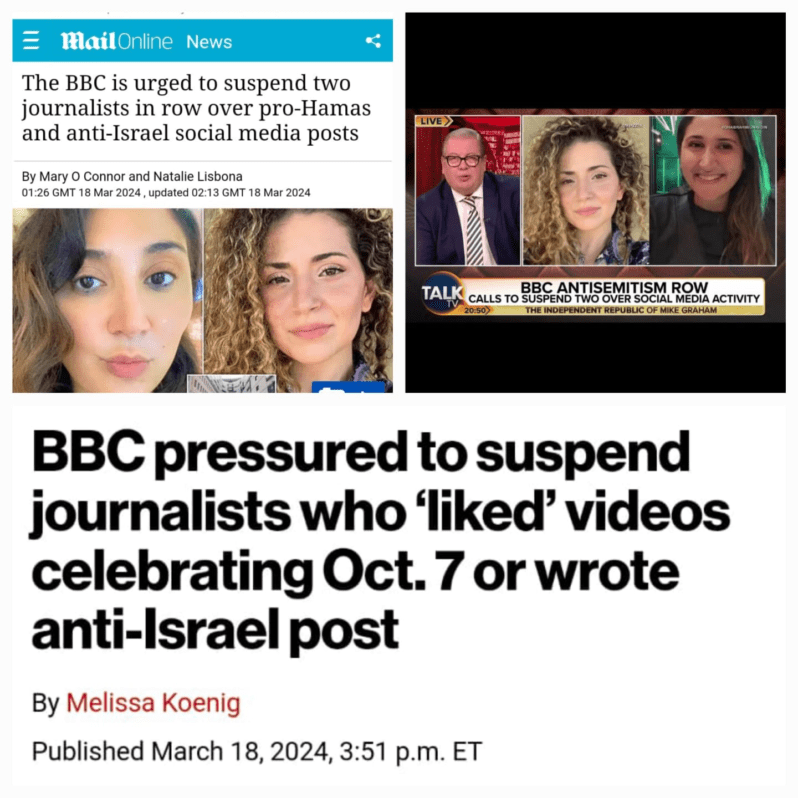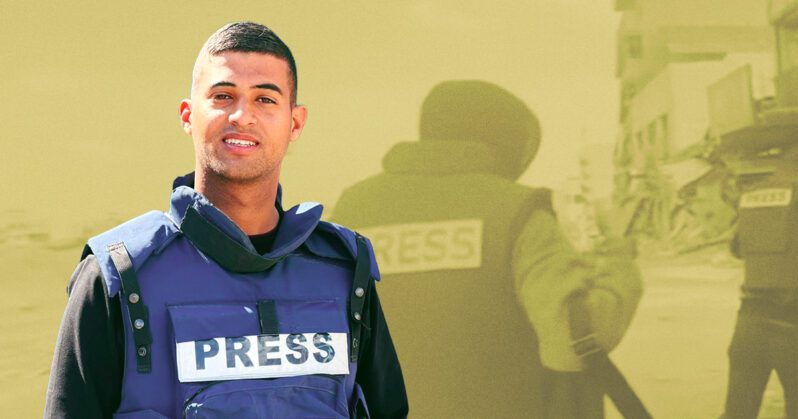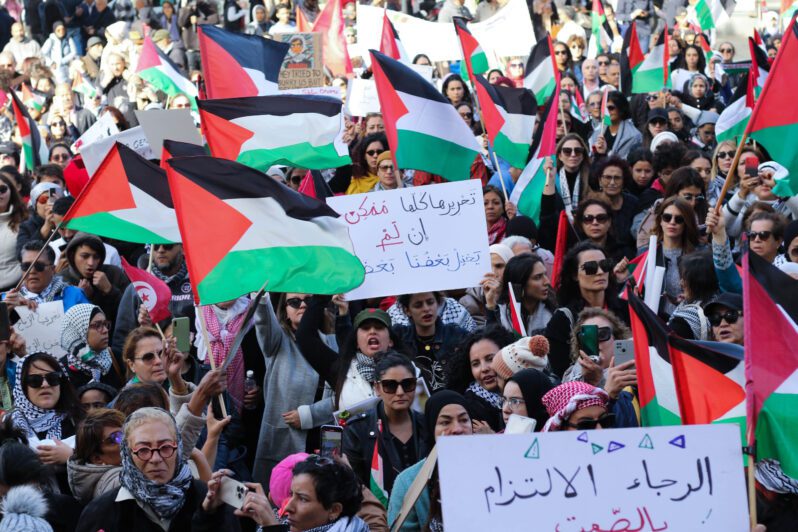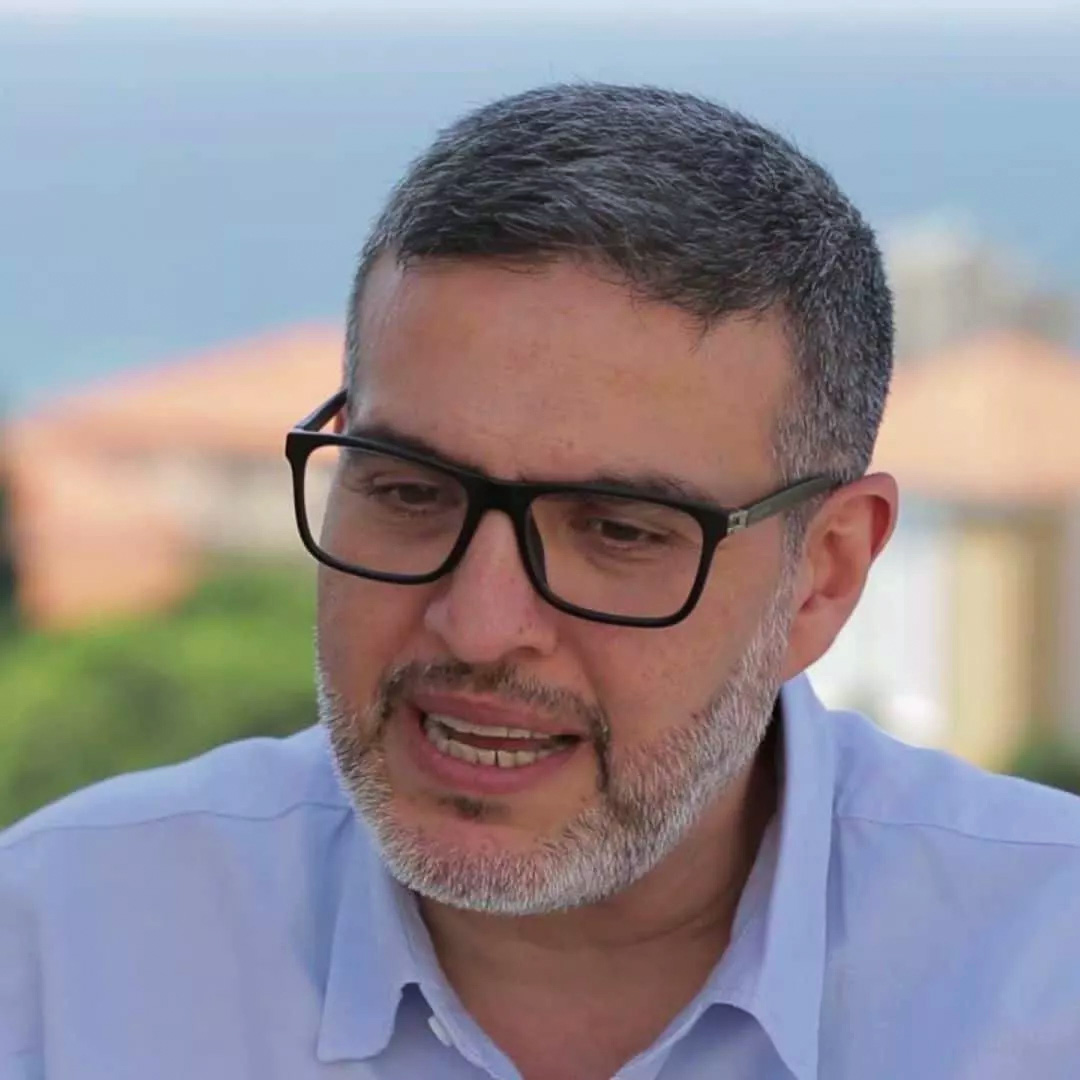Incitement Campaign Targets Arab BBC Journalists Who Documented Israeli Violations

Last month, our colleagues at the BBC Marie-Jose Al Azzi and Soha Ibrahim woke up to find their names and pictures circulating in British newspapers and on several social media pages as part of a campaign of incitement demanding that they be investigated and fired. This occurred after an investigation to which they contributed was published by the BBC in both English and Arabic. The investigation presented testimonies from Gaza’s Nasser Hospital staff about the violations they endured at the hands of the Israeli army.
None of these papers discussed the investigation’s content. Rather, they focused on the people whom they said were “behind” it, i.e. the two aforementioned journalists and Muath Al Khatib, an independent journalist who contributed to the reporting. They said that these journalists “liked” social media posts or videos that celebrated the “Hamas terrorist attacks” or were “anti-Israel”, contending that their “bias” casts doubt over the report. Hence, the papers questioned the “quality journalism the BBC purports to produce in exchange for the British public’s license fee payments”.
The same papers that talked about “bias” quoted in their articles a spokesperson for CAMERA, which The Telegraph introduced as “an organisation which seeks to monitor media coverage of Israel” and was itself behind the investigation of four France 24 workers and their stigmatization as “antisemitic” last year. The BBC stressed that “we stand by our journalism” and that “those who have read our story will know the BBC has been transparent”. However, it clarified that when it comes to the social media activity of employees, “we take allegations of breaches of our social media guidance very seriously,” and that it had taken “urgent action to investigate each case in detail”.
Although the investigation was appended with the names of other workers who contributed to it, particularly by verifying information, the campaign only targeted the Arabs. This is reminiscent of what a number of journalists working in international media institutions have said. Several such journalists told the Legal Agenda that they have become a “subject of suspicion and accusations just for being Arab” and now “feel uneasy”, especially after October 7.
What troubles these journalists most is not the institutions’ internal codes that limit their social media activity in one way or another but the double standard in the application of these codes. No colleague who likes a pro-Israeli post is held accountable, whereas they are held accountable for their intentions and for posts dating back to before they joined their institutions based on how Zionist groups openly biased toward Israel interpret them.
Multiple Arab journalists working in Western media institutions say that the issue is not just that they have become prisoners of self-censorship but also that they feel insecure. Accusations of “antisemitism” could affect their freedom of movement as some countries consider antisemitism a crime and might therefore decline to grant entry visas, in addition to constricting their job opportunities in several media institutions. Such accusations could also pose a threat to their safety due to the publication of their pictures and incitement against them.
In his context, Director of the Institute of Media Research and Training in the Lebanese American University Jad Melki considers the media to be part of the current war. He says that because the media and Zionist organizations cannot prevent the violations that the Israeli occupation is committing from reaching the public, the media is trying to cast doubt over any report criticizing Israel and the backgrounds of the people who prepare it, which is easy to do when they are Arabs.
Because the accusation of “antisemitism” has long been easy to promote due to the vast support Israel enjoys in Western circles, it is being leveled at journalists based not on its actual definition but on any criticism of Israel and its practices. The accusation is used to silence journalists for life and make them virtually unemployable.
Smearing the BBC’s Arab Journalists
On March 12, the BBC published an investigation discussing violations that medical staff of Gaza’s Nasser Hospital endured at the hands of the Israeli army. The investigation, which was titled “Gaza medics tell BBC that Israeli troops beat and humiliated them after hospital raid”, documented the testimonies of doctors and medical workers who were detained. For example, Dr. Ahmed Abu Sabha spoke about the conditions of his week-long detention and said that “muzzled dogs were set upon him and his hand was broken by an Israeli soldier”. The investigation matched his account to the accounts of two medical staff members “who wanted to remain anonymous for fear of reprisals”.
The BBC reported that the Israeli army “did not respond directly to questions about these accounts, or deny specific claims of mistreatment. But they denied that medical staff were harmed during their operation”.
The report also spoke of a video obtained from one eyewitness in the hospital. The videos show “IDF soldiers wheel[ing] two hospital beds and the occupants’ hands are hoisted above their heads, zip-tied”. The BBC mentioned that it had verified the video’s authenticity.
The report also spoke of separate footage published by the Israeli army in which “people can be seen lying on beds in the hospital grounds with their hands zip-tied, their arms in a similar raised position”. The BBC mentioned that, “We do not know who these people are, or what happened to them after this footage”.
A few days after the report was published, Al Azzi and Ibrahim – the two BBC journalists whose names appear on the report as additional contributors – were surprised to find that their names, pictures, and countries of residence had been published in the Daily Mail, which described them as biased journalists who had liked anti-Israel posts. The paper also mentioned Al Khatib, an independent journalist who also contributed to the reporting that underpinned the report.
Although the report is appended not just with the names of these three journalists but also the names of three other BBC workers who helped verify the information, the campaign was limited to the Arab journalists.
The paper claimed that Ibrahim “liked” a video showing activists slashing an oil painting of former British prime minister Arthur Balfour, videos of people from Lebanon and Tunisia chanting, dancing, and waving Palestinian flags in the street on October 7, and a video of Egyptian football fans chanting “we sacrifice our souls, our blood for Palestine” in the wake of October 7. As for Al Azzi, the paper said that she “described Israel as a ‘terrorist apartheid state’” in a post that dates back to 2018 and has since been deleted.
While the paper did not publish Al Khatib’s picture, it said that he published an anti-Jewish post on Facebook while on holiday in Thailand in 2016. It mentioned that he is an independent journalist residing in Jerusalem and working part-time for the Palestinian state news agency WAFA.
The paper quoted a spokesperson for CAMERA as saying that these journalists “join the ever-growing list of now more than ten BBC staff members who cover the war for the corporation while their personal social media accounts clearly indicate that they are not impartial observers”
CAMERA introduces itself as an organization “devoted to promoting accurate and balanced coverage of Israel and the Middle East” headquartered in Boston. The website of its Arabic branch says that it strives to “follow a range of Western Arabic-language media that cover the Arab-Israeli conflict, expose nonobjective coverage, and communicate with the operators of these media in an attempt to correct their errors”.
The campaign did not stop at the Daily Mail. British newspaper The Telegraph published an article titled “BBC to investigate after reporter ‘liked’ pro-Hamas posts”. The paper stated that the BBC will investigate its employees’ use of social media “after a journalist who reported claims that Israeli soldiers beat medics in Gaza ‘liked’ pro-Hamas posts” calling Israel “genocidal” and Hamas “freedom fighters”.
The Telegraph focused on Ibrahim, enumerating additional posts that it said she liked. These posts include a “video explaining Marxist thinker Frantz Fanon’s justification for people to use violence to oppose oppression” and a post by Jeremy Corbyn “defending pro-Palestine marches taking place across the UK”.
Like the Daily Mail, The Telegraph also quoted CAMERA and relayed the organization’s concern about the impartiality of BBC staff.
The baton was then passed to the American New York Post, which is also considered a low-credibility paper in the United States. Under the headline “BBC pressured to suspend journalists who ‘liked’ videos celebrating Oct. 7 or wrote anti-Israel post”, it too published pictures of Al Azzi and Ibrahim.
Likewise, British news presenter Mike Graham criticized – via Talk TV – the BBC for “taking so long to suspend two journalists [Al Azzi and Ibrahim] who branded Israel as ‘terrorists’” and argued that these journalists – whose pictures he published – have no right to be in the BBC. Of course, the campaign expanded to social media pages, which incited against the journalists, circulated their pictures, and accused them of “terrorism”.
Discrediting Journalists When Discrediting Information Is Difficult
Some of the people concerned place the campaign against BBC journalists in the context of a broader campaign against the BBC itself, which has, for example, refused to call Hamas a terrorist organization. “The Arab journalists in the BBC are a scapegoat in a political battle inside Britain led by the right and the Conservatives to defund the international service,” says one journalist in a European media outlet. However, what is happening to BBC journalists cannot be divorced from the notion that Western media, especially after October 7, is party to the war that must stand with Israel, even if by flouting the principles of impartiality, objectivity, and professional standards, or else come under attack.
In this regard, Melki says that because the states supporting Israel and the Zionist organizations cannot prevent the occupation’s violations from reaching the public, the focus is being placed not only on pumping out fake news but also on discrediting any published report showing these violations. If the report is watertight, then there are efforts to question the backgrounds of the people who prepared it, which is easy to do when they are Arabs. “Discrediting, if it succeeds and in light of the enormous influx of news reaching the recipient, is also an effective means,” he adds.
Melki explains that journalists are no longer being held to professional standards. While journalists are being attacked just because some of their behavior is interpreted as criticism of Israel or any action by it, journalists who fabricate news and mislead the public – including ones who boast that they used to serve in the Israeli army and never miss an opportunity to show their support for Israel – are left alone. He mentions that the charge of antisemitism, which has long been the easiest accusation to promote, in most cases has no connection to the term’s true meaning and definition. Rather, the accusation gets leveled against anyone who criticizes Israel or even just questions any action – even if clearly true – by it.
Regarding some newspapers’ publication of the journalists’ pictures and countries of residence and the fact that this practice conflicts with journalistic ethics as it endangers and smears them without any investigation, Melki says that because the media considers itself part of a war in which Israel has been allowed to overstep the law and the International Bill of Human Rights, it will of course disregard professionalism. He believes that the longer the war continues and the more Israel’s violations reach the public, the fiercer the pro-Israeli media and the repression of journalists will become. Eventually, we will reach press dictatorship like that practiced, for example, by America during the Second World War.
BBC Defends the Content of Its Report
The Legal Agenda contacted the journalists targeted by the campaign, but they declined to comment. As for the BBC’s administration, it said in a statement relayed by the aforementioned papers that “we stand by our journalism” and that anyone who reads the investigation “will know the BBC has been transparent in telling audiences where and how information is corroborated and attributed, and where this has not been possible”. It added that it had “provided multiple first-hand accounts”, “named independent sources”, “shared the visual evidence”, and “included rights of reply throughout”.
As for employees’ activity on social media, a BBC spokesperson said that it takes “allegations of breaches of our social media guidance very seriously” and had taken “urgent action to investigate each case in detail”.
This is not the first time that the social media activity of the BBC’s Arab journalists has been raised because of “specialized websites that monitor Arab journalists working in international institutions” and go after them for “a like, interaction, or post that they feel is not impartial, specifically regarding Palestine”, according to several journalists whom the Legal Agenda contacted. Late last year, the BBC suspended six Arab journalists (four of whom later returned to work) in the Cairo and Beirut offices and conducted an administrative investigation into them because of social media activity supposedly biased toward Palestine.
They too were subject to a smear campaign at the time. The Telegraph published an article titled “BBC reporters in the Middle East appear to justify killing of civilians by Hamas”. Under this headline, it published the names and pictures of the journalists. Other British papers, including The Sun and the Daily Mail, followed suit.
The Accusation That Never Dies
“Whether or not the BBC journalists are investigated, and irrespective of any measures that may or may not be taken against them, self-censorship will inevitably increase among them,” says one journalist working in an international institution. She adds, “Unfortunately, we Arab journalists in international institutions have felt additional pressure after October 7. Just because we’re Arab, we are not allowed to express our opinion on things that Israel does because it will be seen as anti-Israeli coming from an Arab who hates Israelis and Jews, while the description [expressed in the opinion] could be true”.
According to this journalist, what is especially grave is that Arab journalists are now being held accountable for social media posts or activity that dates back, not just to before October 7, but also to years before they joined institutions with internal policies that impose social media constraints. She says, “Our objection is not to internal policies to which we agreed. Rather, it’s that these policies are being applied to Arabs alone and to subjects that relate to any action by Israel or are even just understood that way by pro-Israel groups”.
Another journalist speaks of a change in the way that Arabic content is handled in some international institutions: “Oversight over this content has become greater. In the past, it was checked only by the people responsible for Arabic content. Today, it is translated before publication and checked by non-Arabs. After October 7, our content has come to be questioned just because we’re Arabs”.
The issue of smearing journalists and categorizing them as “antisemitic” or “anti-Israel” concerns more than just freedom of expression and its suppression. Rather, the effects go as far as ending the journalists’ careers, limiting their freedom of movement, and threatening their personal security. “Maybe this is the intent – to mute any opposing voice,” says one journalist.
In this regard, another journalist who was investigated by her institution after being accused of antisemitism by “pro-Israeli groups” based on social media activity several years ago narrates how her “life was destroyed”.
She tells the Legal Agenda that although the judge in the labor court to which her case was referred said that her social media posts do not fall under “antisemitism”, and although she appeared in the domestic media of the European country where she resides, the smears by media outlets, publication of her pictures, and incitement against her all continued. “They didn’t contact the judge,” she says, “and they did not question the attorneys in the case. They smeared me even though the ruling was in my favor”.
The accusation of which the court exonerated her years ago follows this journalist to this day. She has not been able to find work and faces problems renewing her residency: “I haven’t been able to find work. I write on Arab platforms under a pseudonym with a salary that puts me below the poverty line, because the mere appearance of my name revives the campaign against me. I am living without a residency with only a paper that says that my residency is under examination,” she says.
She continues, “I deleted my presence as a journalist. I don’t publish under my name or have social media because I am subject to constant harassment and stalking, which makes me feel uneasy and unsafe. My spirits have been crushed”.
Another journalist who was previously accused of “antisemitism” speaks about how the accusation impacted his ability to find work. “I cannot work in any domestic institution here where I reside. The accusation against me, which was not proven, stands as a barrier between me and finding work,” he tells the Legal Agenda. He adds, “I thank God that I live in a country that so far doesn’t consider ‘antisemitism’ a crime. Otherwise, I would have faced more troubles, even though the content based on which I was accused is not antisemitic”.
Note that the German network Deutsche Welle dismissed a number of the journalists in its Arabic section, accusing them of “antisemitism” and “hostility to Israel”. The institution went even further by developing a definition of antisemitism and making it binding for its workers. The new definition includes not just Holocaust denial but also refusal to recognize “the right of Israel to exist”.



